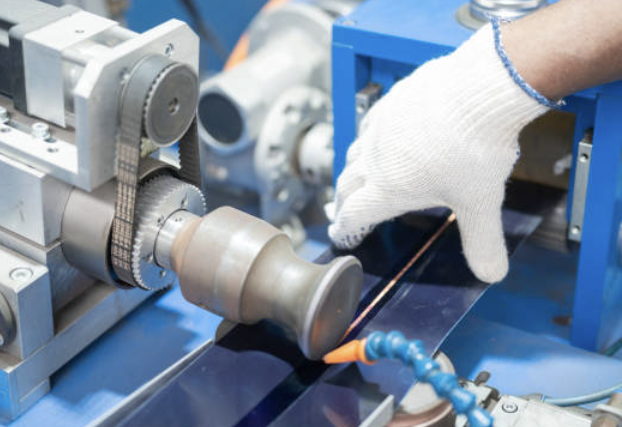
Posted on Thursday, October 31, 2024
Choosing the right roll-forming machine can significantly impact the efficiency, quality, and cost-effectiveness of production, especially in a competitive market like Germany. In the construction, automotive, and industrial sectors, specific roll-forming profiles are in high demand, each requiring a machine optimized for precise, reliable production. In this guide, we’ll cover the top roll-forming profiles used in Germany and the types of machines best suited for manufacturing them.
Germany’s industrial landscape uses a variety of roll-forming profiles to meet its high construction, automotive, and infrastructure demands. Here are some of the most popular profiles:
Steel panels are widely used in both residential and commercial construction throughout Germany. They are preferred for roofing and cladding due to their durability, weather resistance, and aesthetic appeal. Common materials include galvanized steel, aluminum, and pre-painted steel, which can withstand the German climate.
Structural frames and purlins are essential in the construction of steel buildings, especially for industrial and agricultural projects. Profiles such as C, Z, and U shapes provide support and stability for structures and are typically made from high-strength steel for load-bearing applications.
Cable trays and conduits are fundamental components in Germany’s infrastructure projects. These profiles support electrical systems by organizing and securing cables within industrial and commercial buildings. The materials of choice are often galvanized steel and aluminum, selected for their durability and ability to handle weight without sagging.
Germany’s automotive sector, known for its quality and precision, demands specialized roll-formed profiles. These include components for crash management, chassis support, and other structural elements, which require high-strength materials and exacting standards to ensure safety and performance.
For German manufacturers, the efficiency and versatility of a roll-forming machine can be a critical competitive advantage. Here’s a look at which machines are best suited for producing these high-demand profiles:
These machines are designed to produce various panel profiles with precision. Features like hydraulic cutting and quick adjustment systems help maintain high production speeds and quality.
Given the demand for structural frames in construction, C/Z/U roll-forming machines are a staple. Machines with quick-change features allow manufacturers to switch between profiles without extensive downtime.
Cable tray roll-forming machines are essential for meeting Germany’s infrastructure needs. Machines equipped with perforation and bending functions are highly advantageous, as they allow customization in terms of width, thickness, and shape.
These machines are specialized to meet the rigorous demands of automotive applications. High precision, multi-stage forming capabilities, and the ability to work with lightweight alloys are essential for producing durable automotive parts.
The German market has specific standards and needs, particularly in manufacturing. Here are some critical machine features to look for when purchasing a roll-forming machine:
German manufacturing emphasizes high-quality, precise production. Machines that offer fine-tuning capabilities for different metal thicknesses and shapes ensure that profiles meet Germany’s exacting standards, especially in automotive and structural applications. Adjustable tooling is also valuable, allowing flexibility for various projects without needing multiple machines.
When buying roll-forming machines, consider the electrical requirements in Germany. Machines should comply with the standard German power supply (380V/50Hz) to ensure they operate efficiently without requiring additional modifications.
Automation has become an essential feature for roll-forming machines in Germany. Smart controls, including automated feeding, cutting, and quality inspection, can reduce human error, improve production rates, and maintain consistent quality.
Choosing the right roll-forming machine can be a significant investment, and German buyers should consider the following tips:
Germany’s market for roll-forming profiles is diverse, spanning the construction, automotive, and infrastructure sectors. By understanding which profiles are in demand and selecting machines optimized for these profiles, buyers can ensure they meet both market needs and production standards. Carefully consider the types of profiles you plan to manufacture, the machine’s compatibility with German standards, and the availability of automation features to maximize productivity. A well-informed decision can help manufacturers not only meet the demands of today but also be prepared for future growth.

Used Purlin Roll Forming Machines for Sale Worldwide
Posted on Sunday, January 25, 2026
Pre-Owned Roll Forming Machines for Purlin & Structural Steel Profiles

Used Roof Panel Roll Forming Machines for Sale Worldwide
Posted on Sunday, January 25, 2026
Pre-Owned Roll Forming Machines for Roofing Panel Production

Used Roll Forming Machines for Sale Worldwide
Posted on Tuesday, January 20, 2026
Pre-Owned Roll Forming Machines with Inspection, Verification & Global Support

Steel Coil Supply for Roll Forming Machines Worldwide
Posted on Tuesday, January 20, 2026
Reliable Steel Coil Supply for Roll Forming, Fabrication & Manufacturing Applications
Copyright 2026 © Machine Matcher.